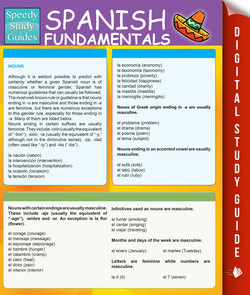Читать книгу Spanish Fundamentals 1 (Speedy Study Guides) - Speedy Publishing - Страница 2
На сайте Литреса книга снята с продажи.
ОглавлениеNOUNS
Although it is seldom possible to predict with certainty whether a given Spanish noun is of masculine or feminine gender, Spanish has numerous guidelines that can usually be followed. The most well-known rule or guideline is that nouns ending in -o are masculine and those ending in -a are feminine, but there are numerous exceptions to this gender rule, especially for those ending in -a. Many of them are listed below.
Nouns ending in certain suffixes are usually feminine. They include-ción (usually the equivalent of “-tion”), -sión, -ia (usually the equivalent of “-y,” although not in the diminutive sense), -za, -dad (often used like “-ty”) and -itis (“-itis”).
la nación (nation)
la intervención (intervention)
la hospitalización (hospitalization)
la ocasión (occasion)
la tensión (tension)
Nouns with certain endings are usually masculine. These include -aje (usually the equivalent of “-age”), -ambre and -or. An exception is la flor (flower).
el corage (courage)
el mensaje (message)
el espionaje (espionage)
el hambre (hunger)
el calambre (cramp)
el calor (heat)
el dolor (pain)
el interior (interior)
la economía (economy)
la taxonomía (taxonomy)
la probreza (poverty)
la felicidad (happiness)
la caridad (charity)
la mastitis (mastitis)
la meningitis (meningitis)
Nouns of Greek origin ending in -a are usually masculine.
el problema (problem)
el drama (drama)
el poema (poem)
el tema (subject)
Nouns ending in an accented vowel are usually masculine.
el sofá (sofa)
el tabú (taboo)
el rubí (ruby)
Infinitives used as nouns are masculine.
el fumar (smoking)
el cantar (singing)
el viajar (traveling)
Months and days of the week are masculine.
el enero (January) el martes (Tuesday)
Letters are feminine while numbers are masculine.
la d (d) el 7 (seven)
